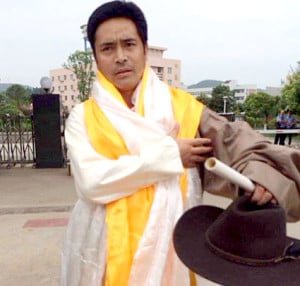Four Tibetan political prisoners released after fulfilling their sentences in Amdo and Kham

Tibetan writer Buddha is draped in khatas after his release from Chinese prison.
Chinese authorities announce opening of police stations in Tibetan monasteries, escalation of surveillance over monks
Authorities in a Tibetan area of Gansu announced the establishment of five police offices in Tibetan monasteries this week, with an official report stating that it was part of a “recent focus on policing monasteries”. The new offices are part of a rollout of plans announced after 2008 for construction of police stations in Tibetan monasteries, under Chinese policies of placing almost every monastery in Tibet under direct government rule and intensifying Party presence in both rural and urban Tibetan areas. This heightened security is increasing tensions, with Tibetans expressing particular despair and resentment about the intrusive nature of security forces in religious institutions. For more, please read the full ICT report.
Tibetans held for opposing Chinese mining operations in Chabcha
Chinese police have detained dozens after local Tibetans announced their intention to protect their land and environment, according to an RFA report. The marble mines, which had begun to encroach on local villages and holy mountains, had continued operating even after their contracts with the local government expired. A local source told RFA that “there is a sacred place near the mining site where the local Tibetans worship and make offerings, fly prayer flags, and burn incense to please the local deities.”
International journalists in China report deteriorating conditions
According to a report by the Foreign Correspondents Club of China, a professional association of journalists based in Beijing, 99 percent of responding journalists “do not think reporting conditions in China meet international standards. 80 percent feel conditions have worsened or stayed the same in the past year–up 10 percentage points from the May 2013 survey. Not one member said conditions had improved.” Restrictions on reporting from Tibet were specifically named as a top concern, along with interference, harassment, and physical violence by authorities and the intimidation and harassment of sources. The FCCC noted that at least 42 respondents were told reporting from Xinjiang and Tibet was restricted or prohibited, and that reporters who did enter these areas did so with difficulty and faced consistent intimidation and interference.

